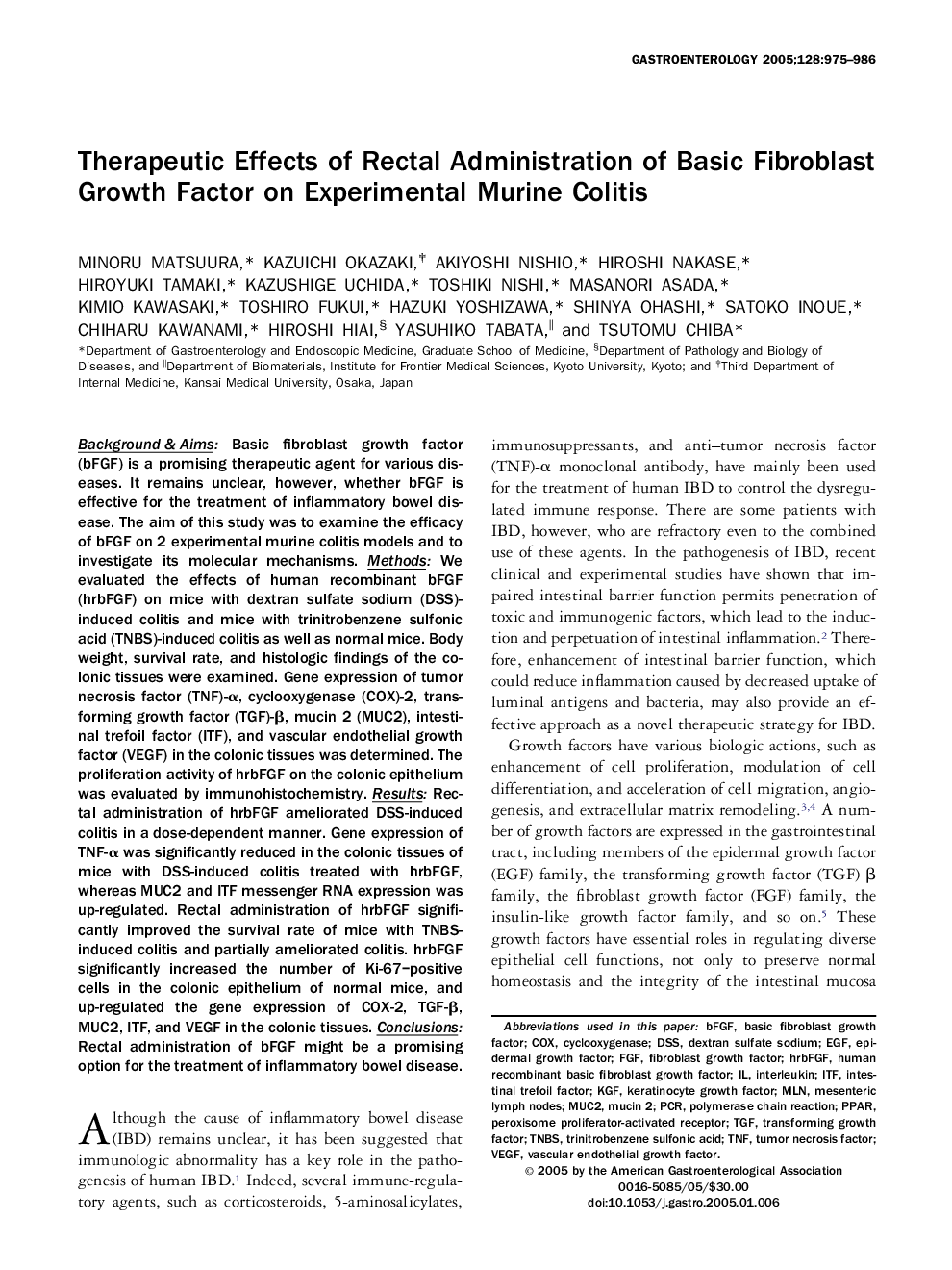| Article ID | Journal | Published Year | Pages | File Type |
|---|---|---|---|---|
| 9245490 | Gastroenterology | 2005 | 12 Pages |
Abstract
Background & Aims: Basic fibroblast growth factor (bFGF) is a promising therapeutic agent for various diseases. It remains unclear, however, whether bFGF is effective for the treatment of inflammatory bowel disease. The aim of this study was to examine the efficacy of bFGF on 2 experimental murine colitis models and to investigate its molecular mechanisms. Methods: We evaluated the effects of human recombinant bFGF (hrbFGF) on mice with dextran sulfate sodium (DSS)-induced colitis and mice with trinitrobenzene sulfonic acid (TNBS)-induced colitis as well as normal mice. Body weight, survival rate, and histologic findings of the colonic tissues were examined. Gene expression of tumor necrosis factor (TNF)-α, cyclooxygenase (COX)-2, transforming growth factor (TGF)-β, mucin 2 (MUC2), intestinal trefoil factor (ITF), and vascular endothelial growth factor (VEGF) in the colonic tissues was determined. The proliferation activity of hrbFGF on the colonic epithelium was evaluated by immunohistochemistry. Results: Rectal administration of hrbFGF ameliorated DSS-induced colitis in a dose-dependent manner. Gene expression of TNF-α was significantly reduced in the colonic tissues of mice with DSS-induced colitis treated with hrbFGF, whereas MUC2 and ITF messenger RNA expression was up-regulated. Rectal administration of hrbFGF significantly improved the survival rate of mice with TNBS-induced colitis and partially ameliorated colitis. hrbFGF significantly increased the number of Ki-67-positive cells in the colonic epithelium of normal mice, and up-regulated the gene expression of COX-2, TGF-β, MUC2, ITF, and VEGF in the colonic tissues. Conclusions: Rectal administration of bFGF might be a promising option for the treatment of inflammatory bowel disease.
Keywords
EGFTNFMuc2TNBSMLNKGFTGFITFPPARFGFbFGFDSSCOXcyclooxygenaseTrinitrobenzene sulfonic acidinterleukintransforming growth factorDextran sulfate sodiumintestinal trefoil factorepidermal growth factorKeratinocyte growth factorVascular endothelial growth factorVascular Endothelial Growth Factor (VEGF)fibroblast growth factorbasic fibroblast growth factortumor necrosis factorMucin 2polymerase chain reactionPCRmesenteric lymph nodesperoxisome proliferator-activated receptor
Related Topics
Health Sciences
Medicine and Dentistry
Gastroenterology
Authors
Minoru Matsuura, Kazuichi Okazaki, Akiyoshi Nishio, Hiroshi Nakase, Hiroyuki Tamaki, Kazushige Uchida, Toshiki Nishi, Masanori Asada, Kimio Kawasaki, Toshiro Fukui, Hazuki Yoshizawa, Shinya Ohashi, Satoko Inoue, Chiharu Kawanami, Hiroshi Hiai,
